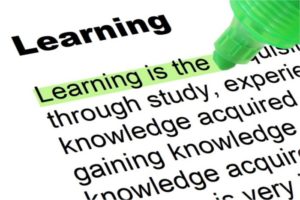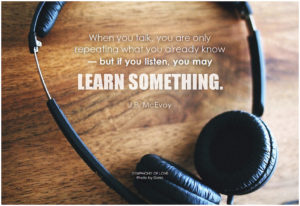I consider myself more open-minded than others and yet still conservative at times. My opinions are hardly ever an issue of debate because I know how to listen and to disagree with kindness. Keeping things on an even and respectable keel is imperative for adults. Adults know better than to lash out. They don’t yell or show aggression. Instead, what adults mistakenly tend to do if they disagree is they won’t entertain a different opinion rather than continuous learning. They may not burst with anger, but they block others out regardless. The individual who wishes to one day become a successful creative writer does not do this.
When meeting new people, learning through listening is—without a doubt—the most important trait you can have. Approaching the awkward obstacle of meeting potential friends is easy if you attend it in a position of a learning pupil. Follow me as I provide tips for building friendships through listening and learning, which will give the writer more fuel for the creative fire.
The Learning of Two Minds
Opened Minds
Verbal tactics tend not to bother them too much, thus giving them more abilities to regauge and connect again. The open-minded person sees the objector in a conversation as an obstacle with the main goal to promote some type of similar interest in a topic. If successful, the open mind will have broken through a barrier to build upon a promising friendship. True open-minded individuals will stop at nothing to build rapport with another. They seek not gossipy information, but relevant information that can help them be a better person (and a better writer). Furthermore, they hope that by having a dialogue with you that you will learn something new, as well.
Closed Minds
Simply put, these are disagreeable people. They can entertain intelligent conversations with you and even eloquently articulate their opinions. However, they are hardly (if never) willing to allow another person to change their minds.
This is a very dangerous perspective. In all sincerity, myself included, we all think our opinions are correct. The way we perceive a topic or reality, in general, is relative to only us. And that is due to our actual experiences in previous situations or what we have learned from others who we have deemed worthy to mold our opinions. Therefore, we are automatically in a position to think our opinions are right. It’s natural. It’s pride. However, my own experiences have taught me otherwise. True enlightenment, which then brings peer bonding, comes from admitting that you do not have the right answers. You might be wrong, your pride is unjustified. The mega-great grandfather, Greek philosopher, Socrates, has stated the same:
“The only true wisdom is in knowing you know nothing.”—Socrates
Learning by Listening
Making and keeping friends is a humbling experience. There will be times when to maintain a friendship, you may have to hinder your opinion. Swallowing your pride is never an easy task, but sometimes it is necessary for the greater good (and the better story).
I have no problem with expounding my opinion around others I have newly met. I rather enjoy the introductory process. And I am sure many others feel the same way. Locating where others stand on particular subject matters instantly informs you of how close you are in furthering that friendship. But, if you talk to someone—anyone—long enough, even if you think you agree on all topics, you will realize you have some different opinions. This is a good thing.
Each time you have a difference of opinion, you can test your open-mind skills.
Don’t clam up and stay silent. That is worse than actually disagreeing. Simply agreeing with the other is not necessarily a good call, either.
Instead, ask questions. Ask why your new friend sees through that perspective. Listen to the answer. Probe with another question. Get them talking. I suggest that you should enter the disagreement with the specific intentions to have your mind changed. Learn from them. Once they have expounded their replies, don’t immediately respond. At least I don’t. I let what they have told me swish around in my mind for a moment before retorting.
Telikó (Greek for Conclusion)
History has proven to us that opinions cannot be changed by force. Opinions change only from an individual experiencing something new. All of the surveys and polls and statistics cannot do this for you. You have to do it on your own.
And if you sit there, with your new batch of possible friends you just met, taking in their opinions that you fundamentally disagree with, I advise you to take a second to ponder. Maybe you will be a better person, make more positive choices, and live a more fulfilled life if you listened to an opinion that differs from your own. Whatever the outcome, please, if not for the sake of having your mind changed but only to make friends—engage in discourse.
But, What’s the Writing Connection?
Simple. A great writer is a great listener, too. Although creative writing is quite solitary, writers enjoy human interaction. By listening to other points of view, the writer has an arsenal of literary weapons at his or her disposal.
Depending on the opened/closed conversations you might have had, you can utilize them for your storytelling. Have a character question the meaning of his life in connection to a sick family member. Write witty dialogue from the snappy comeback you heard from a person who didn’t want to hear your opinion. Any and all engagements with people should be documented for later usage in a writer’s narrative. I guarantee some of the most interesting moments you will use will come from learning to listen. As a writer, think of this as hitting two birds with one stone. You can improve your social rapport with others by listening to them and then you can use that content for your story.
Amazon has a phenomenal book on Socrates you can see here.
~M


